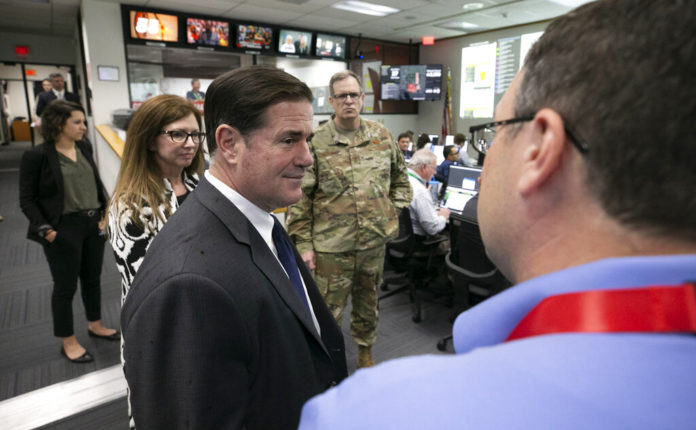
A woman who has been a key figure leading Arizona’s response to the coronavirus pandemic has resigned after complaining she was being sidelined from her role.
Wendy Smith-Reeve, director of the Arizona Division of Emergency Management, submitted her resignation late last week and it was accepted Saturday by Doug Ducey.
In Smith-Reeve’s resignation letter, she cited concerns that her job had essentially been taken over by Ducey’s staff and the state health department and her “presence and function is duplicative” during the COVID-19 pandemic.
The state’s emergency operations will now be directed by Maj. Gen. Michael T. McGuire. Anthony Cox, who has served as deputy director since 2017, now is the acting director.
Ducey and the Department of Health Services, led by Dr. Cara Christ, have been the public face of the administration’s response to the pandemic. McGuire is leading the state’s efforts to deploy thousands of National Guard troops to help deliver food to stores and other needed support tasks.
Christ is overseeing the health response and plans to nearly double the state’s hospital capacity with help from hospitals and the U.S. Army Corps of Engineers. The health department wants existing hospitals to boost space and plans to reopen two closed hospitals, convert a specialty hospital and use large facilities for treating patients who no longer need acute hospital care. Other actions include scouring surgery centers and other facilities for space and respirators and other equipment needed to treat an expected surge of virus patients.
Christ said last week that the state could need between 7,000 and 13,000 additional hospital beds by May. There currently are 16,900 licensed hospital beds in Arizona.
The epidemic of COVID-19 is expected to peak in Arizona in mid-April, with hospitalizations hitting their high in May.
Arizona health officials reported Sunday that the state now has tallied at least 919 COVID-19 cases and 17 deaths, up from 773 cases and 15 deaths as of Saturday. Maricopa County, the state’s most populous county and where the most coronavirus cases have been reported so far in Arizona, now has 546 cases.
Pima County reported on Sunday its second death in two days and sixth overall while the Tohono Oóldman Nation tribe near Tucson reported its first positive test.
“The Nation has been preparing for our first COVID-19 case, and there will likely be more to come,” tribal chairman Ned Norris, Jr. said in a statement.
Of Arizona’s 15 counties, only Greenlee County hasn’t reported any coronavirus cases.
The Navajo Nation reports 115 cases of which 94 in Arizona on the vast reservation that also includes parts of New Mexico and Utah.
For most people, the new coronavirus causes mild or moderate symptoms, such as fever and cough that clear up in two to three weeks. For some, especially older adults and people with existing health problems, it can cause more severe illness, including pneumonia and death.
Smith-Reeve, who reported to McGuire, became director in May 2013 after joining the agency as a finance specialist in September 1996. She managed the state’s emergency preparedness, response, recovery and mitigation efforts.
In her resignation letter, Smith-Reeve complained about what she saw as a diminished role leading emergency response efforts and said that the governor wasn’t following the state emergency response plan, which he had approved in 2017.
“That is not healthy for the Team who are working tirelessly on this event,” she wrote. “The directives from the Governor’s office have been to work completely outside of the” plan.
Ducey’s chief operations officer, Daniel Ruiz, said in an email to the governor’s chief of staff recommending the resignation be accepted. He said Christ’s agency was designated by Ducey to lead the public health response with support from McGuire and Smith-Reeve.
“This has been a successful effort,” Ruiz wrote. “Dr. Christ has coordinated a fantastic group of professionals at the Health Emergency Operations Center, and Major General McGuire and Deputy Director Smith-Reeve, have assembled the state’s best and brightest at the State Emergency Operations Center.”
Chief of Staff Daniel Scarpinato tweeted that “Arizona is grateful to have the very steady leadership of Major General McGuire leading our emergency operations during this critical time,” adding that the state “won’t miss a beat with him and his team at the helm.”
Republished with the Permission of the Associated Press.














